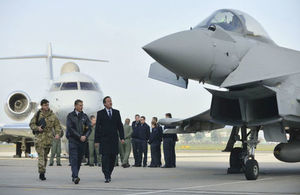PM pledges £178 billion investment in defence kit
The Prime Minister will announce a £178 billion investment in defence equipment and support over the next decade .

- £12 billion uplift in equipment budget
- 9 new Boeing P8 maritime patrol aircraft
- 2 new strike brigades by 2025 for rapid deployment missions both of which will be up to 5,000 strong
The Prime Minister will announce a £178 billion investment in defence equipment and support over the next decade when he unveils the government’s 5 year National Security Strategy and Strategic Defence and Security Review in the House of Commons later today.
The £12 billion uplift in funding will be focused on investments that will help to ensure the UK can respond to diverse threats in an increasingly dangerous and uncertain world. These will include:
Aircraft
Nine new Boeing P8 maritime patrol aircraft for maritime surveillance, anti-submarine and anti-surface ship warfare will increase further the protection of our nuclear deterrent and our new aircraft carriers. These roles require an aircraft that can carry torpedoes, as well as being fitted with a broad range of sensors, including radar and sonobuoys, which are operated from the rear of the cabin by a team of specialists. These aircraft will also provide maritime search and rescue and surveillance capabilities over land.
Typhoon
We will be extending the life of our multirole Typhoon for 10 extra years through to 2040, meaning we will be able to create 2 additional squadrons. This will give us a total of frontline 7 squadrons, consisting of around 12 aircraft per squadron. We will also invest in their ground attack capability and fit them with a new active electronically scanned array radar to ensure they can continue to operate in hostile environments in the future.
Strike brigades
We will create 2 new ‘strike brigades’ by 2025 to be rapidly deployable, able to self-deploy thousands of kilometres, and with a much lower logistic footprint. They will use the new Ajax family (previously known as Scout) range of vehicles, comprising 6 variants and almost 600 armoured vehicles.
The Prime Minister is expected to make further announcements later today as he sets out the government’s comprehensive approach to national security, including boosting its soft power and focusing aid on fragile states and regions to tackle the root causes of conflict.
Writing in the foreword to the National Security Strategy and Strategic Defence and Security Review, the Prime Minister says:
Our national security depends on our economic security, and vice versa. So the first step in our National Security Strategy is to ensure our economy is, and remains, strong.
Over the last 5 years we have taken the difficult decisions needed to bring down our deficit and restore our economy to strength. In 2010, the total black hole in the defence budget alone was bigger than the entire defence budget in that year. Now it is back in balance.
By sticking to our long-term economic plan, Britain has become the fastest growing major advanced economy in the world for the last 2 years. Our renewed economic security means we can afford to invest further in our national security.
This is vital at a time when the threats to our country are growing. From the rise of ISIL and greater instability in the Middle East, to the crisis in Ukraine, the threat of cyber attacks and the risk of pandemics, the world is more dangerous and uncertain today than 5 years ago.
So while every government must choose how to spend the money it has available, every penny of which is hard-earned by taxpayers, this government has taken a clear decision to invest in our security and safeguard our prosperity.
As a result, the United Kingdom is the only major country in the world today which is simultaneously going to meet the NATO target of spending 2% of our GDP on defence and the UN target of spending 0.7% of our GNI on development, while also increasing investment in our security and intelligence agencies and in counter-terrorism.
…..
At its [the strategy] heart is an understanding that we cannot choose between conventional defences against state-based threats and the need to counter threats that do not recognise national borders. Today we face both and we must respond to both. So over the course of this Parliament our priorities are to deter state-based threats, tackle terrorism, remain a world leader in cyber security and ensure we have the capability to respond rapidly to crises as they emerge.
….
Our armed forces, our police and our security and intelligence agencies put their lives on the line every day. Their service is an inspiration to us all and they are the pride of our nation. Through this National Security Strategy and Strategic Defence and Security Review we will back them and use our hard-earned economic strength to support our armed forces, and to give those in our police and our security and intelligence agencies who fight terrorism the resources they need to help keep our country safe.